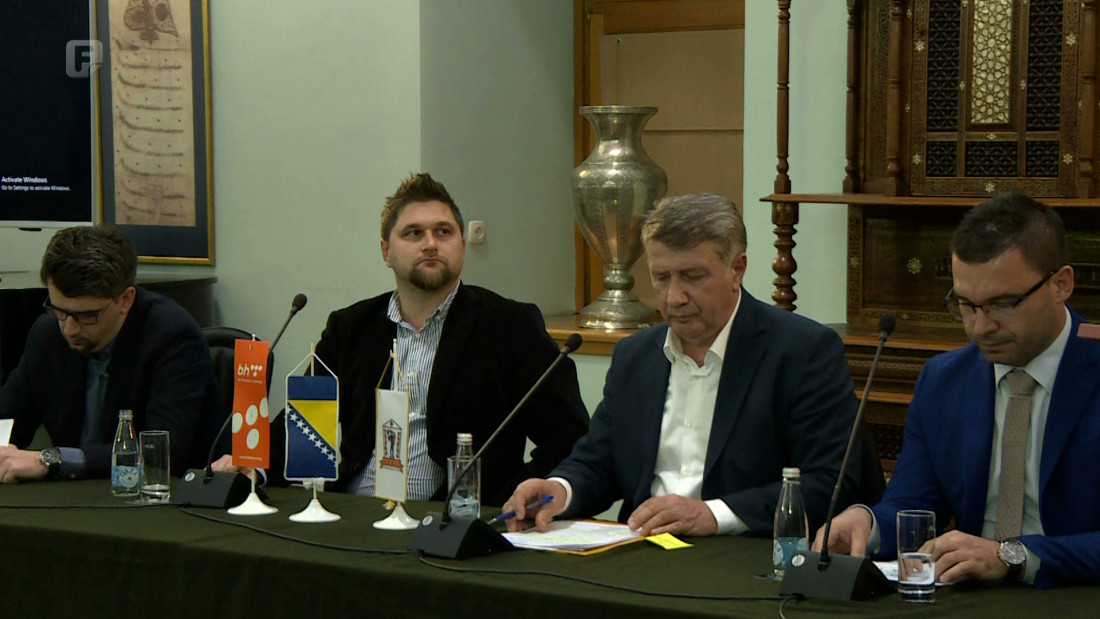Organized by the Archives of the Federation, a scientific conference and an exhibition on the topic "Documented but unjudged genocide" were organized at the Bosniak Institute in Sarajevo on Wednesday.
As stated by the archival institution of the entity of the Federation of Bosnia and Herzegovina, one of the goals of the project is to contribute to the fight against the falsification of the recent past in Bosnia and Herzegovina and to offer a scientific response to quasi-scientific projects that seek to deny the genocide of Bosniaks.
"This is a fight for the truth, that is, opposition to lies, certain goals. Primarily, we can say the goal of the Second Memorandum to SANU, which states in its first strategic goal that it is important to reduce the crimes committed by the Republic of Serbia. They work there in what way and with what methods", said the director of the Archives of the Federation of Bosnia and Herzegovina, Hajrudin Ćuprija.
He pointed out that the Archive of the Federation wants to present to the public for the first time documents that, as he said, "clearly prove that the genocide was committed not only in Srebrenica, but throughout Bosnia and Herzegovina and that it was systematically planned by Serbia."
As he said, for the aforementioned, the Archives of the Federation hired three scientific workers, experts in the field of crime and genocide research, who analyzed more than 200,000 documents in order to make a selection of 107.
In their many years of scientific work, they have collected thousands of primary sources, which they use in publishing books and scientific works in Bosnian and English, and present them in the country and abroad, spreading the scientific truth about what happened in Bosnia and Herzegovina.
Muamer Džananović, research associate of the Institute for the Research of Crimes Against Humanity and International Law of the University of Sarajevo, emphasized that experts in the field of crime research are living in a period of struggle for a narrative about the period of aggression in Bosnia and Herzegovina and the genocide against Bosniaks.
"Really, big funds are being invested. It is institutionally denied, and in this regard it is very important to oppose such quasi-scientific projects, attempts to relativize aggression, denial of genocide with science and scientific research," Džananović said.
Hikmet Karčić, research associate of the Institute for the Islamic Tradition of Bosniaks, said that in the territory of the smaller Bosnian entity Republika Srpska, the last stage of genocide is present - its denial, as well as the new, 11th stage, specific to Bosnia and Herzegovina: triumphalism, that is, the celebration of crimes.
"It is precisely for this reason that we wanted to speak out against those two phenomena through this exhibition where we presented documents 'from the other side'. This is the documentation that belongs to the political, military and police services of the Republic of Srpska and the Republic of Serbia. These are essentially documents where the criminals themselves admit what was done and what they planned," said Karčić.
Recalling that before the International Tribunal for the Former Yugoslavia and the International Court of Justice, only what happened in Srebrenica during July 1995 was characterized as genocide against Bosniaks, Jasmin Medić, research associate of the Institute of History of the University of Sarajevo, said that based on the very definition genocide committed on a larger area of Bosnia and Herzegovina that was part of the RS.
"When you analyze the six strategic goals, which means that it is actually genocidal intent, when you see what was committed in that area, you will clearly see that it is genocide. German courts have proven in several cases that genocide was committed here, specifically against Bosniaks. Undoubtedly, this could have been proven before the International Court, but it was not. The fact that if someone is not convicted of genocide and is convicted of a crime against humanity is problematic in our public, then we ignore it," said Medić.
As part of the Federation Archives project, a formal academy will be organized on Thursday at 7 p.m. in the Youth Center (Skenderija), where the highest awards in archival activity will be awarded.
As announced, the exhibition, which becomes the permanent property of the Archives of the Federation after Sarajevo, will be promoted throughout Bosnia and Herzegovina, as well as in Europe and the world.

(1).png)
(1).png)